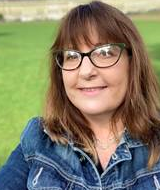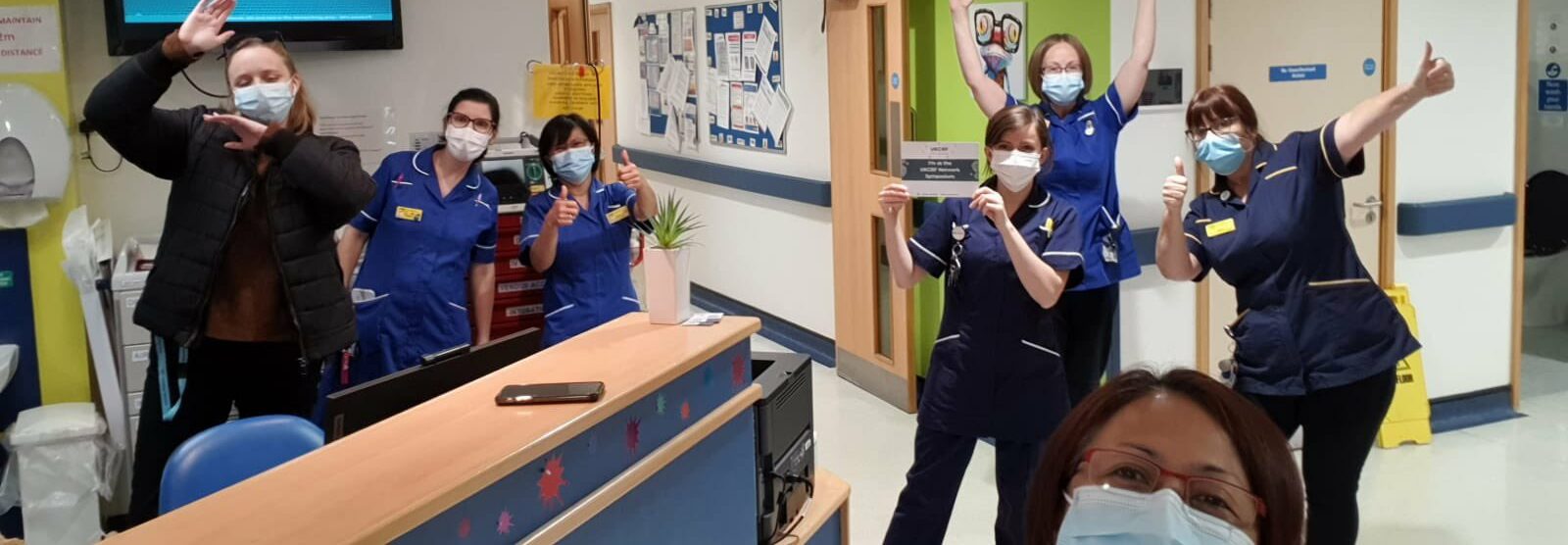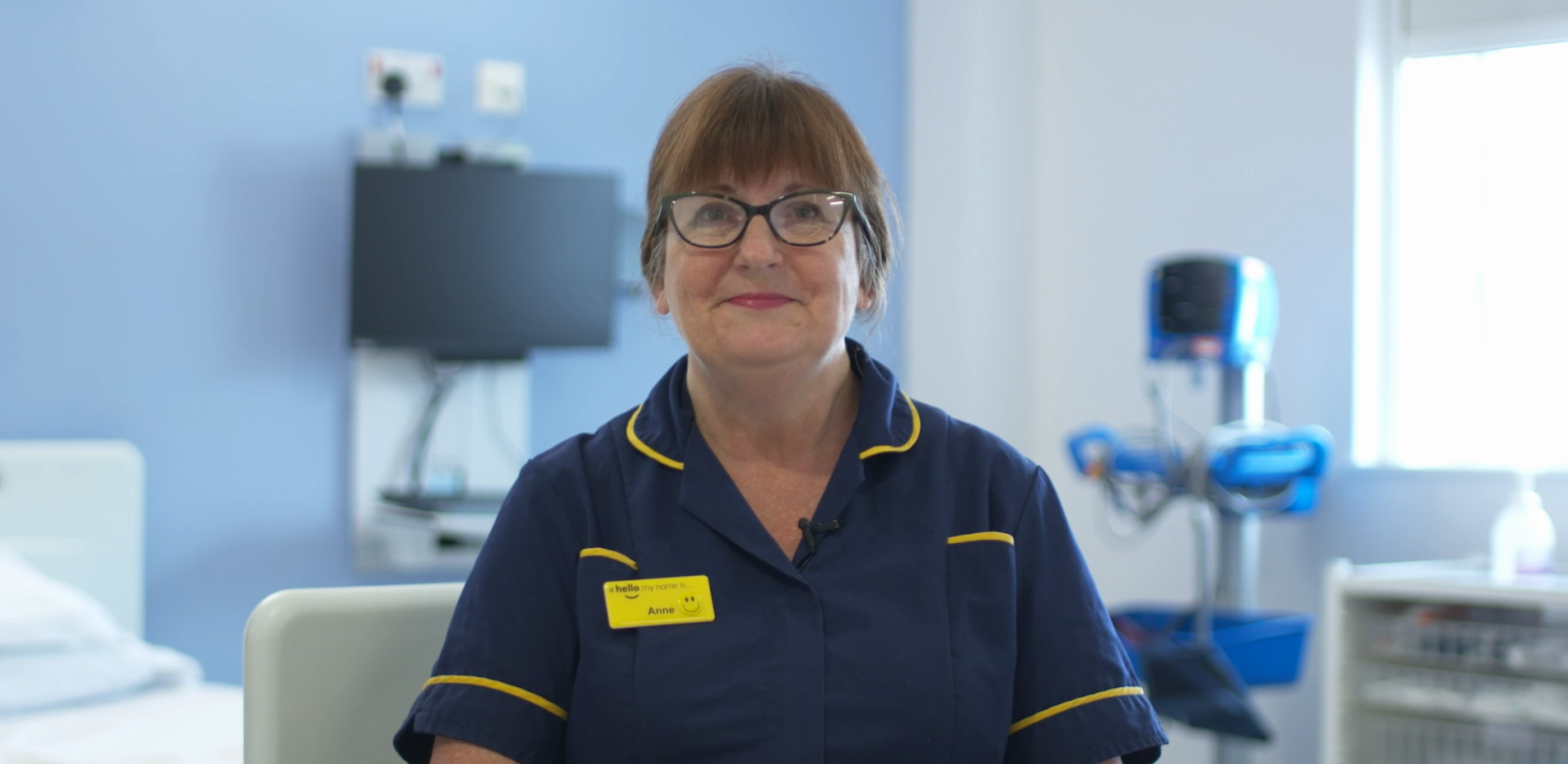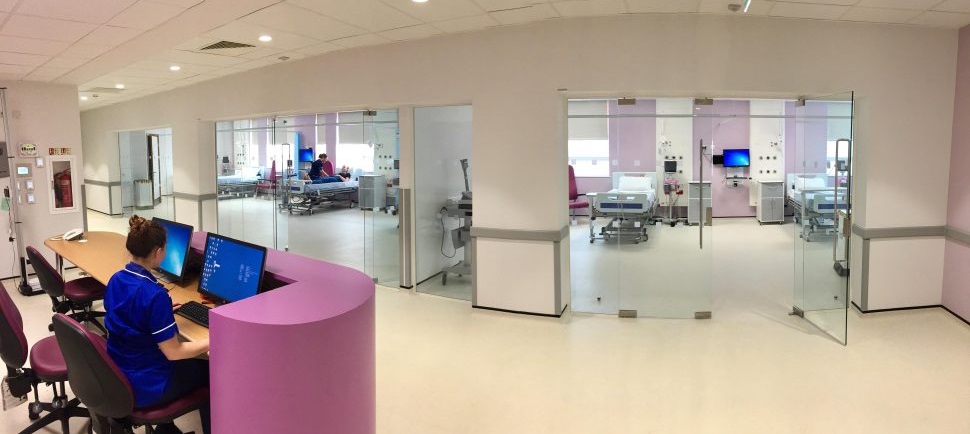
Written by Anne Elmer
Matron, NIHR Cambridge CRF
January 2022
Anne Elmer, Matron at NIHR Cambridge CRF, shares her story, including how she got into Clinical Research, the role of a CRF Matron, a typical day and her experience running a COVID follow-up clinic.
What was your background prior to the CRF?
My background is as a dual-trained nurse, adult and paediatric. In 2009 I was working on a paediatric ward when I was asked to help with a children’s research trial at the NIHR Cambridge CRF, by a colleague who had recently started a new job as a paediatric research nurse.
My initial response was ‘Where is the CRF? What do they do there? I can’t do research, I’m not clever enough,’ but that all changed when I came for a visit. My colleague Janet talked me through the research visit (it was a diabetes trial), I met the young patient and so enjoyed the atmosphere of discovery that I was immediately hooked. As soon as a job became available there, I jumped at the chance to try a new field and I’ve loved it ever since!
What’s your role?
I’m matron of the CRF at Cambridge University Hospitals (CUH) and my role is to ensure patients and participants are safe when they are taking part in research and that the data/results that are obtained from the study are robust and accurate.
I have oversight of all studies within the NIHR Cambridge CRF and work closely with Cambridge Clinical Research Centre (CCRC) Matrons and team leaders to ensure we continue to provide a world class service to the patients, participants, academic and industry partners. I work with the senior team of the CCRC, including two matrons, as we’re essentially one team with one management and governance structure.
I love the daily collaboration with nurses, medics, academics to Trust departments to offer amazing opportunities for patients and healthy volunteers to be involved in research and make a difference in their own and others’ lives.

NIHR Cambridge CRF staff celebrating the UKCRF Symposium 2021
Video: Anne's experience during the COVID-19 Pandemic
What does a usual day look like?
My day begins the same way as on most wards, with a ‘handover’, but it involves all the staff, such as the team leader, nurses, ward clerk and ward assistant. We discuss the research studies running that day, what activities are involved (taking blood, giving an experimental drug, and any patient issues – if someone needs to be collected from the main entrance etc.)
As nurses, we also work in the sample handling rooms based on the ward to centrifuge blood samples, so staff are allocated to those areas too.
The most common misconception of research nurses is that we are entering data into a computer, but you couldn’t be further from the truth. While there’s a very tiny amount of that, the nurses in the NIHR Cambridge CRF and CCRC also complete all the regular nursing tasks; nursing care, taking vital signs, cannulation, ECGs, venepuncture etc. as you would on a ward.
We have added skills though, including in-depth knowledge of Good Clinical Practice, and practical skills of sample processing, lumber punctures, skin biopsies, muscle biopsies, vaccinations and endoscopy, to name a few.
But getting back to my average day, I could be looking after an elderly patient or a young child, as each day is different. For example, I recently looked after a delightful nine year old girl who came in for a research visit – she had agreed to take part in a trial called Innodia, as she was a newly diagnosed diabetic.
After checking with her and mum that she was still happy to consent to carry on with the visit (this was her second time at the NIHR Cambridge CRF), I removed the Emla numbing cream that mum had applied at home and cannulated her, ready to take repeat blood samples over the next two hours. She drank her milkshake – for the study, not from McDonald’s – and I took blood samples from her cannula and processed them ready to be shipped off by courier later in the day.
We talked about the study, played hangman and chatted. When the blood taking had finished, she had breakfast with mum as they were both hungry, and then off they went home to enjoy the rest of their day.
My philosophy is to ensure that every patient and health volunteer that attends our facility has an attentive, personal, professional and friendly service. Research is not about a one-off visit, it’s about retention of those volunteers who give up their time to help, as research is for all.

Tell us about a case that really stands out to you
We have been running a COVID follow-up clinic on behalf of CUH and have had the pleasure of meeting many patients who have suffered from the virus.
Initially, I was involved in looking at COVID admissions and offering patients research trials to understand the nature of the virus. Once the patients were discharged, I rang them to complete a questionnaire of how they were feeling and what symptoms they were still experiencing.
The case that stands out for me is a male patient who was usually fit and well, but now he was unable to walk without significant assistance and it had devastated his life. He talked about his experience of being in hospital, his fear of dying and fear of never regaining his former self.
The patient attended the follow-up clinic with his wife soon after our phone call and struggled with his walking. He was seen by various members of the medical team, including physiotherapy, and was given a plan to aid his recovery. As he was so keen to find answers, the patient also agreed to take part in the Post-hospitalisation COVID-19 study (PHOSP-COVID), a further research study looking at the long-term effects of COVID, and over the next few months he attended the NIHR Cambridge CRF on a regular basis.
We have seen him grow stronger and stronger, and last week he told us that he had returned to playing golf. I know this isn’t the case for all COVID patients, but his regular attendance at the unit has allowed us to see his steady progression first-hand. He said he had loved attending and wanted to take part in any other research projects we had going, as he had really enjoyed the time he spent with us.
e-Poster: COVID Collaboration – Coming Together
What do you enjoy most about your role?
I love working in the innovative, fast-paced, supportive, inclusive, world-class research environment that is the NIHR Cambridge CRF and CCRC.
The variety of patients and healthy volunteers that we see on a daily basis, from babies to adults, is incredible.
I also like reading complex research protocols and simplifying their language, and working with our industry partners, but most of all I enjoy finding answers to questions and making research happen!




